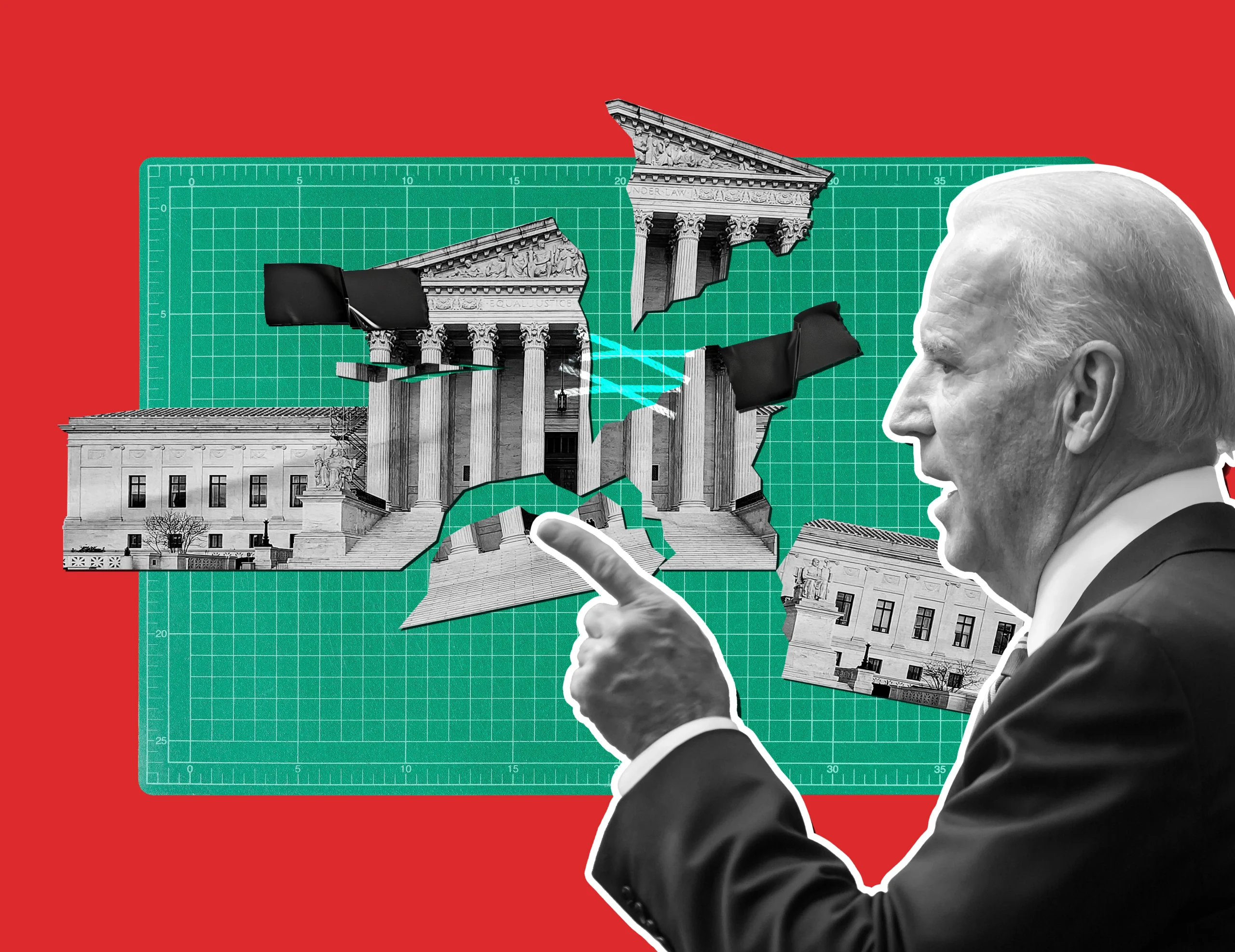The Supreme Court: Is Reforming it Practical or Political?
President Biden attended a White House press conference on July 29th to announce his formal recommendation for reforms to the Supreme Court. The President also wanted to ensure that no president is above the law and can still be prosecuted for crimes committed while in office, according to a White House Fact Sheet.
Across the aisle, Republicans are calling Biden’s reforms politically motivated and claim that the Supreme Court is fine the way it is.
So, who’s right? Let’s dive into the details and break it down to see what really going on.
Biden’s List of Reform Recommendations
President Biden’s recommended reforms consist of three parts:
Term Limits for Supreme Court Justices:
President Biden supports the President appointing a justice every two years to serve an 18-year Supreme Court term, according to the White House press release. This would help ensure more regularity to make the timing for court nominations more predictable, Biden says.

No Immunity for Crimes a Former President Committed While in Office:
President Biden is calling for a Constitutional amendment that clarifies the limits of the President, ensuring that no president is above the law or immune from prosecution of crimes enacted during their time in office. This is the “No President Is Above the Law Amendment.” The amendment clarifies that the “Constitution does not confer any immunity from federal criminal indictment, trial, conviction, or sentencing by virtue of previously serving as President.”

A Binding Code of Conduct for the Supreme Court:
The Supreme Court should not be exempt from adhering to the same enforceable code of ethics that other federal judges are subject to, according to the recommended changes. This includes disclosing all gifts, refraining from political activity publicly, and recusing themselves from cases in which they or their spouse present a conflict of interest, financial or otherwise, according to the White House, President Biden wants to work with Congress to, “prevent the abuse of Presidential power, restore faith in the Supreme Court, and strengthen the guardrails of democracy.”

Why Some Think Reforms May Be Necessary
Scandals have stuck to the Supreme Court Justices like flies on honey for years. Justices Clarence Thomas and Samuel Alito have both dominated the news cycle, and the concerning information revealed during Justice Brett Kavanaugh’s confirmation hearing has shaken the public’s faith in the system.
Ethics Concerns Shake Public Confidence: Are Rich People Buying Our Justices?
Concerns that public confidence is waning in the Judiciary are spreading, especially among groups like the Campaign Legal Center (CLC). “It is critical for the public’s trust in our democratic institutions that the highest court in our nation is held to at least the same ethical standards as the other branches of government and lower courts, and that justices are held accountable when they violate those standards,” they said in a statement about ethics on February 20th.
This statement stems from the CLC’s submission of additional information on ethical concerns related to Justice Clarence Thomas. Justice Thomas established a nearly 30-year pattern of disclosing gifts and other financial interests and then excluding them after it gained attention resulting in backlash and speculation, according to the CLC’s Supplemental Letter to the Judicial Conference.
Unfortunately, the scandals surrounding Justice Thomas don’t stop there. Speculation arose during Justice Thomas’ confirmation hearing as Anita Hill, Thomas’ aide at the time, accused him of sexual assault in her testimony on October 11, 1991. Despite this accusation, Thomas was still appointed Justice. Hill’s story returned to light in 2018 when Justice Brett Kavanaugh was accused of sexual assault during his confirmation hearing, echoing Justice Clarence’s confirmation, according to a PBS News report. Hill spoke of similarities of her case while speaking on ABC News. Notably, one of the similarities was the Senate’s eagerness to hold hearings without a proper investigation.
Are Political Views Guiding Supreme Court Decisions? The People Want to Know
Justice Samuel Alito has also come under fire for his refusal to recuse himself from a case concerning an alleged participant in the Jan. 6 insurrection. This happened after the New York Times published a photo of an upside-down American flag reportedly flown for days at the Justice’s home after the January 6th insurrection and leading up to the Presidential inauguration, according to an ABC News report. Upside-down flags are traditionally a signal of great distress, but January rioters adopted it as a symbol, even carrying it as they stormed the capital, according to the ABC News report.
Samuel claimed that his wife flew the flag upside down after a dispute with a neighbor.
“As soon as I saw it, I asked my wife to take it down, but for several days, she refused,” Justice Alito said in a letter to Senators Durbin and Whitehouse.
In the same letter, Justice Alito refused to acknowledge the conflict of interest, stating, “A reasonable person who is not motivated by political or ideological considerations of a desire to affect the outcome of Supreme Court cases would conclude that this event does not meet the applicable standard for recusal. I am, therefore, duty-bound to reject your recusal request.”

This was not Justice Alito’s stance of recusal, however, when he was appointed to the position of Justice. “A judge can’t have any agenda…[or]…any preferred outcome in any particular case,” Justice Alito stated during his confirmation hiring in 2006. Fast-forward to 2024, Lauren Windsor from The Intercept got Justice Alito on tape saying that “…there are differences on fundamental things that really can’t be compromised,” and presented the audio on The Intercept podcast and YouTube channel.
Recent rulings have highlighted these concerns and have some questioning if the Justices’ political views cloud their ability to rule cases based on the Constitution. Some of the most recent cases include:
- Fischer v. United States – The Court found in favor of the defendant who allegedly participated in the January 6th insurrection. “To prove a violation of §1512(c)(2), the Government must establish that the defendant impaired the availability or integrity for use in an official proceeding of records, documents, objects, or other things used in an official proceeding, or attempted to do so,” they wrote.
- Trump v. United States – The Court ruled in favor of Trump. “Under our Constitutional structure of separated powers, the nature of Presidential power entitles a former President to absolute immunity from criminal prosecution for actions within his conclusive and preclusive constitutional authority. And he is entitled to at least presumptive immunity from prosecution for all his official acts. There is no immunity for unofficial acts,” the court stated in the ruling.
- Dobbs v. Jackson Women’s Health Organization – The Court ruled to overturn the Roe v. Wade decision. “The Constitution does not confer a right to abortion; Roe and Casey are overruled; and the authority to regulate abortion is returned to the people and their elected representatives,” the Court said in the ruling.
In light of these most recent rulings, the overall approval rating of The Supreme Court is at 43%, near its lowest point, which was 40% in 2021 when the Court overturned Roe v. Wade, according to Gallup. The political divide is clear in this poll. Even with the Supreme Court at near record lows, 66% of Republicans approve of the Court and its conservative-leaning rulings, while only 15% of Democrats approve. It should be a surprise to no one that it is mostly the liberal voices who are calling for Supreme Court reform.
Calls for Supreme Court Reform: Yay or Nay
With the recent scandals, rulings, and rising ethics concerns about Supreme Court Justices, calls are being made for a binding ethics code for the Supreme Court.
Support for Reforms
Justice Elena Kagan has been speaking about the importance of public confidence in the Supreme Court for years, saying that “the court must earn its legitimacy” and thus the people’s confidence, she said, speaking on C-Span in July 2022. In the same interview, she also stated her views concerning Justices, who vote based on their own political views as opposed to according to the law saying, “You have to apply methods that, in fact, discipline and constrain you, and you have to apply those methods consistently over cases.”
Don Beyer, congressman of Virginia’s 8th District and co-author of the Supreme Court Term Limits and Regular Appointments Act, issues his support after President Biden’s announcement stating, “Rampant, blatant ethics violations and increasing politicization have made it clear that the U.S. Supreme Court is broken – and that reform is urgently needed to restore Americans’ faith in the integrity of the Court,” in a press release in July.
It is still unclear if all the reforms from President Biden’s announcement can be accomplished, but The Court Reform Now Task Force was formed by Representative Adam Schiff in May, according to a press release announcement. If Congress works with the White House, reforms could become more tenable, and faith in the court may be restored over time.

Arguments Against Reforms
With the outpouring of support for Biden’s recommendations, there are some clear dissents. A number of Republicans have come out against the reforms. “[It’s] a toxic power grab,” said Oklahoma Senator Markwayne Mullin, as reported in a Courthouse News article. Senator Mullin is best known these days for trying to start a fight with a witness during his testimony in November 2023.
Republican-controlled House Speaker Mike Johnson called any bill about Supreme Court Reforms “dead on arrival” and claimed that “President Biden’s proposal to radically overhaul the U.S. Supreme Court would tilt the balance of power and erode not only the rule of law, but the American people’s faith in our system of justice,” Courthouse News wrote.
“You can’t overthrow the U.S. Constitution because you don’t like the results,” said Louisiana Senator Bill Cassidy, reported Courthouse News.
So, Is Reforming the Supreme Court Practical or Political?
There is a clear partisan divide in the discussions of Supreme Court Reform. While Democrats point to ethics concerns and scandals to justify their reasons, Republicans, pleased with the most recent rulings, point to the Constitution as an unchangeable document that must always be upheld.
So, is reforming the court a practical or political issue?
Answer: It should be a practical discussion. Whether you are Republican, Democrat, or Independent, we can see that there are accountability issues within the Supreme Court. The scandals and accusations that go unchallenged create a very real distrust in the system by the American people.
“This should not be a partisan issue. An enforceable code of conduct would be a good thing for the Court and for the country. It is essential to ensuring the American people have confidence in the ethical conduct of Supreme Court justices, and it is essential to restoring the Court’s reputation,” Democratic U.S. Senate Majority Whip Dick Durbin from Illinois said in a Senate Judiciary Committee press release in June.
The problem is that the practical decision is also most likely to swing the Court back toward a more liberal position, meaning that politicians have a reason to push for or against it for political reasons rather than practical ones, which muddies the already murky waters.
A code of ethics for Supreme Court Justices should be a practical decision, especially since there is an ethics code for federal judges in lower courts. One would be forgiven for wanting to hold the Supreme Court to the same standard, if not an even higher one. One could argue that the Highest Court in the Land should be held to the highest standards of the land, especially when the Court’s reputation is what gives their rulings so much power. Even the appearance of corruption damages that reputation, opening the possibility for people not to take the Court seriously, as Justice Elena Kagan spoke about in her interview on C-Span.
Changing the Constitution is also practical. The Constitution was meant to be changed as time passed, as evidenced by the amendments within, which set changes to the original Constitution. The process was not meant to be easy, according to the White House website, but it can and should be done when necessary, especially if the American people agree.
Is the Political Divide Really That Wide?
“An overwhelming bipartisan majority of the American people want the Supreme Court held to a high ethical standard,” said Democratic Senator of Rhode Island, Sheldon Whitehouse, in the Judiciary Committee press release.
New polling may suggest that White House is correct. About 76% of all Americans support a code of conduct for the Supreme Court, including 70% of Republicans, 89% of Democrats, and 75% of Independents, according to a new Ipsos Poll.
On the subject of a Constitutional Amendment, about 70% of all Americans agree that there should be a Constitutional Amendment ensuring that no president is above the law. This includes 54% of Republicans, 89% of Democrats, and 72% of Independents, by the Ipsos poll.
These numbers suggest that the decision isn’t as political as it seems, at least not to the American people. Politicians, who are trying to steer the government in their favor, speak loudly for their cause, but reforms for the Supreme Court are practical, and a majority of Americans agree.
Discover More Muck
Why George Floyd Got Justice But Jonathan Rodgers Got Forgotten
Report John Lynn | Aug 27, 2025

Card Cracker Turned Carjacker Sentenced to Six Years
Report Strahinja Nikolić | Feb 28, 2025

Weekly Muck
Join the mission and subscribe to our newsletter. In exchange, we promise to fight for justice.
Weekly
Muck
Join the mission and subscribe to our newsletter. In exchange, we promise to fight for justice.





